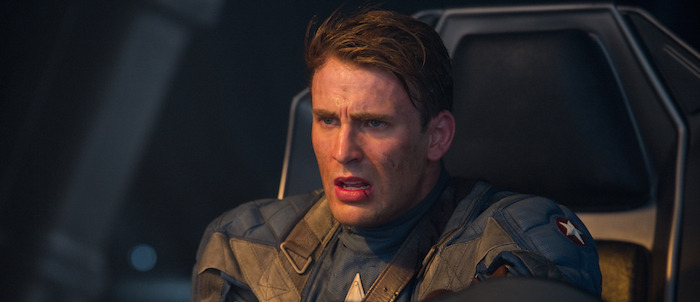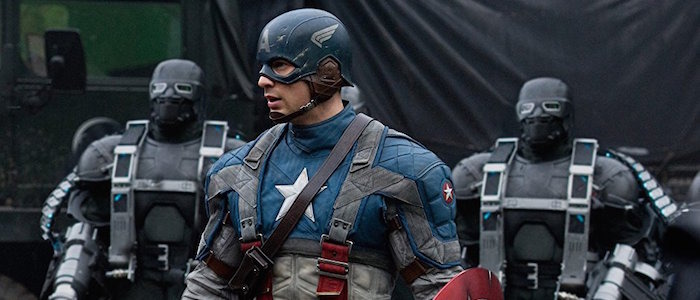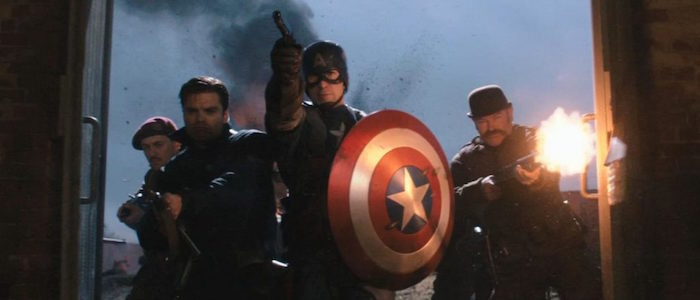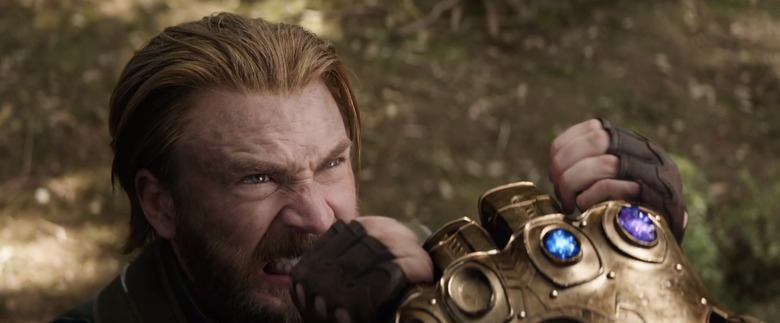'Captain America: The First Avenger' Finds Marvel's Emotional Core And Its Greatest Hero
(Welcome to Road to Infinity War, a new series where we revisit the first 18 movies of the Marvel Cinematic Universe and ask "How did we get here?" In this edition: Captain America: The First Avenger offers Marvel Studios a proper moral compass.)
Steve Rogers is the heart and soul of the Marvel Cinematic Universe. Whether we're watching his solo outings, his Avengers team-ups, or a combination of the two (like Captain America: Civil War), he's interwoven with the moral fabric of this fictional world; a dynamic that arguably holds true even for films in which he doesn't appear. Broken down to his basics, he's the benchmark for righteousness in an ever-changing political landscape, even when said righteousness is called into question. This has been his role in the comics for the better part of this century, making him a vital addition to their filmic equivalent – a series steeped in real world post-9/11 military conflict right from the get-go.
Captain America's first big adventure, much like his 1941 comicbook origin, takes place during World War II. It's an arguably more black-and-white setting compared to the complexities of contemporary geopolitics – the kind of complexities the Iron Man films try (and occasionally fail) to capture – but this backdrop provides both Steve Rogers and the larger Marvel Universe a framework within which to position their outlook on heroism.
Sometimes heroism means fighting on the front lines, like in Captain America: The First Avenger. Sometimes it means lurking in the shadows, like in Avengers: Infinity War. Whatever the case, the answers are never easy and price of freedom is high, but it's a price the Star Spangled Man is willing to pay.
Who’s Strong and Brave, Here to Save the American Way?
What might be clearer now to American audiences than it was in 2011 is the difficulty in selling a superhero with "America" in his name to the rest of the world. In Russia, Ukraine and South Korea, the film was simply titled The First Avenger. To people unfamiliar with his stories on the page, Captain America's image may conjure up the rah-rah, "America First" nationalism exported to all corners by Hollywood's war and action films, not to mention the export of actual war. It's a perception that holds true even for Americans unfamiliar with how much of a critique on American power his stories tend to be, though there's understandably more acceptance of this imaginary version of him Stateside.
This idea is not without precedent, stemming from his stories in the early 1950s, in which he spent several years punching suspected communists in the face before his Timely Comics series was cancelled. Though in 1964, this flag-waving "Commie Smasher" version of the character was retroactively revealed to have been an imposter. The "real" Captain America, i.e. the righteous protector, would now be part of Marvel's The Avengers from their fourth issue on, and was said to have been frozen in ice for several decades – the origin of Captain America's, well, origin story.
It's been seven years since Steve Rogers first burst onto the big screen, and only six since The Avengers. Despite certain territories still opting to drop the "America" half of the title – some know it as the "First Avenger" franchise, though America's marketability hasn't exactly gone up in the last few years – Captain America has been a part of three (soon to be five) billion-dollar box office hits. Even his second solo outing The Winter Soldier made twice as much money globally as its predecessor, and that was without the help of Robert Downey Jr.'s Iron Man. Point being, he's a global mainstay of popular culture, and a generally beloved character the world over.
A character called "Captain America" doesn't achieve that sort of status by leaning in to national identity. Staying neutral on the idea is also, in and of itself, a political stance given that he still roams around punching people while draped in an American flag. The solution therein, both from a marketability standpoint and in order to take the themes touched on in prior Marvel films to their logical conclusion, is to have Captain America brush up against militaristic authority (mildly during World War II, though more so in modern day) in order to set the stage for where the character might go when he finds himself unfrozen in an uncertain time.
Who Vows to Fight Like a Man for What’s Right, Night and Day?
Captain America: The First Avenger hurts – in a good way, that is. Wherever it meanders, whatever narrative threads it rushes or whichever dramatic beats it glosses over – the lack of time dedicated to Bucky and his death is perhaps the film's biggest flaw – its finale still packs a wallop. Having fended off the Red Skull (Hugo Weaving) long enough for the villain to succumb to his own arrogance and lust for power, Steve Rogers steers a plane loaded with warheads and bound for New York City. He speaks to Peggy Carter (Hayley Atwell) over the radio, telling her he has no choice but a suicide mission, or millions of people could die. As he descends, they talk about finally going on that date, where Peggy would teach Steve how to dance, and Steve would probably screw it up anyway. "We'll have the band play something slow," he assures her, placing her picture directly in front of him. "I'd hate to step on your–" the radio cuts out.
Steve Rogers crashes his plane into the ice, somewhere near the Arctic. He wouldn't be found for nearly seventy years. When he awakes, the first thing he recalls as he looks at the new world around him is simply: "I had a date."
The world was never going to end in The First Avenger, a prequel to four different Earth-set films by this point, nor were millions of people ever going to die in New York City. Marvel's alternate history is only alternate to a degree, but the real stakes were never about saving lives. That's what was at stake for Captain America and for the War, but what was at stake in the narrative in this moment, the focal point of some of Marvel's most potent drama, was simply whether or not Steve Rogers would get to see Peggy Carter again.
The reason the conflict packs this kind of punch is because of who Steve Rogers is. He's the same person he was at the beginning of the film, the scrawny little kid from Brooklyn who won't back down from a bully, even if it gets him beaten up. He's that same person during all his film appearances, most recently Captain America: Civil War, which ends with him becoming a vigilante to rescue his wrongly imprisoned friends. He's the guy who does the right thing, and that's precisely why The First Avenger ends on a note of tragedy despite the war being won for his side. Captain America does everything right. Everything. But he still loses everything in the process, because he's the only person capable and more importantly willing to pay the cost of doing the right thing.
This is how the movie had to end, from a meta-narrative standpoint. Steve Rogers had to go in the ice during World War II, kept alive by the Super Soldier Serum in his blood in order to be re-awakened in modern day. But this is also how Steve Rogers' story had to end, because it's exactly how it began. Unlike most Hollywood hero narratives, Captain America doesn't change. He goes through a physical metamorphosis, sure, and his approach to conflict is forever in flux depending on the circumstances around him, but what is constant is the fact that he always strives towards goodness and decency, even in times of war. He's a little guy at heart who fights for the other little guys, and the flag on his chest is everything America ought to be, rather than everything it is.
Captain America is a symbol of the lofty ideals that America as a nation often fails to live up to, because unlike the flag-waving ethos he's often mistakenly thought to have, there's no actual glory in being Captain America. There's no glory in winning, and saving people, and doing the right thing, because circumstances force him to do these things by giving up the opportunity to live a normal life. The world is robbed of him because he chose to fight evil, and in the process, he's robbed of both Peggy and his best friend Bucky (Sebastian Stan), the people who meant the world to him. As much as the film might be a fantasy, with fantasy Nazis and a fantasy space-MacGuffin driving its plot (the first appearance of an Infinity Stone in the MCU), it's a reminder of the very real cost of standing up for other people, and what it takes to truly be a hero – albeit in the broadest possible terms.
Who Will Campaign Door-to-Door for America?
If Captain America: The First Avenger outdoes the politics of its predecessors in any way, it's in at least attempting to contextualize America's outlook on war. Steve Rogers' peer Private Gilmore Hodge remarks on being led by Peggy Carter, a woman and a British citizen, saying he "thought he was signing up for the U.S. Army." The comment is emblematic of the general U.S. military outlook, one steeped in both a nationalist and hypermasculine attitudes, though Peggy proves her worth and responds to Hodge on his own terms, promptly punching him in the face. Hodge is endorsed for the Super Soldier Program by Tommy Lee Jones' Col. Phillips, who looks mostly for physical strength and the ability to follow orders, whereas Stanley Tucci's Abraham Erskine seeks qualities that are "beyond the physical," leading immediately to Phillips tossing a dummy grenade into a group of Soldiers. Hodge hides behind a truck. Steve Rogers lies atop the grenade, without hesitation. A small man, willing to lay down his life for his peers, even the ones who had bullied him. A quality beyond the physical.
The grenade was Steve's second test. His first was being asked by Erskine, a Queens-based scientist originally from Augsburg, if he wants to kill Nazis, to which he responds: "I don't want to kill anyone. I don't like bullies. I don't care where they're from." It's a noble answer, and enough of a barometer for Steve's morality that Erskine picks him for the program, but it isn't an outlook shared by the rest of their country.
Carry the Flag Shore-to-Shore for America, From Hoboken to Spokane
The Super Soldier Program is shut down after Erskine's murder at the hands of HYDRA, but the U.S. Government, not wanting to waste the star power Steve Rogers had garnered through headlines, drafts him into the role of a propaganda figure. He wears a suit resembling his original comic outfit – his first real-world comicbook even makes an appearance, sold on stands as wartime propaganda – and he tours the country reciting pre-written lines about contributing to the war efforts. There's nothing inherently sinister about Captain America's first role in this world being a War Bonds salesman, but the mechanics of this salesmanship are outside his control, and act in contention with who he is. Even the song that plays on his tour, The Star Spangled Man with a Plan, features not only the lyric "Who'll hang the noose on the goose-stepping goons from Berlin?" – an upbeat line clashing directly with Steve's response to Erskine about not wanting to kill anyone – but also "Who'll kick the Krauts to Japan?" Not "Nazis," mind you, but "Krauts," a derogatory term for Germans in general.
In contrast, the film's narrative perspective sides heavily with Dr. Abraham Erskine. The German-born scientist's conversation with Steve the night before his procedure makes mention of a fact that people often forget" the first country the Nazis invaded was their own. Germans like him are also casualties of the war. He reminds Steve to stay a good man no matter what happens, a reminder he alludes to even with his dying breath. He's the Ho Yinsen to Steve's Tony Stark, a man from the very same part of the world America is at war with, showing our heroes kindness and reminding them, even as they die, to do the right thing.
On the flipside however, lie the specifics of film's wartime politics. They don't extend beyond contextualizing Steve Rogers' outlook, a problem the Marvel Cinematic Universe finds itself unable to escape time and time again, even in this film's sequel. HYDRA and the Red Skull are the film's antagonists, threats to the world at large as they attempt to bridge the gaps between science and occult. The Red Skull wishes to ascend to Godhood, and the film borrows the aesthetic elements of Nazism to create Nazi-esque villains that aren't quite Nazis. It even goes so far as giving the Red Skull and Hitler an ideological falling out.
While the decision to obfuscate the horrors of actual Nazism was arguably a sound one – this is a fantasy film after all, and it can't get too ugly – the downside to scaling back HYDRA's actual connections to the Nazi regime is that it occurs to the point of divorcing them entirely. By removing the specifics of what drives Nazi ideology and leaving only its texture, from the uniforms to occultism to vague notions of superiority – not once is it remarked upon that blond, blue-eyed Steve Rogers is, ironically, an Umbermensh opposing the Nazis – the result is inadvertently an ideological vacuum.
The Red Skull, like the remnants of HYDRA in The Winter Soldier, seek power and global domination in the broadest possible strokes, rendering even the good-natured Steve Rogers a mirror to fascism in the abstract. He may fight for the little guy, but who is the little guy in this scenario? Whose necks are HYDRA's boots stepping on, exactly? Captain America is a hero like no other, but who is he fighting for? If he resents bullies and fascism and global domination, what does he support? What does Captain America truly represent?
While Steve Rogers initially disobeys orders in order to rescue his fellow Allied soldiers, he falls back in line with the very same military whose propaganda he was once the face of, never questioning or redefining their approach, not even fine-tuning it so that less people die. He does, however, keep unquestionably fighting the bad guys at great personal risk, and the climax still packs the punch that it does, despite a lack of anything resembling real world politics even at a time of political volatility. It manages to be enough for the time being – at least until the series demands ideological specificity.
The Star Spangled Man With a Plan
A celebrity during World War II, Captain America is a fugitive in 2018. Once a man desperate to serve his country, he now has a clearer understanding of the faults of that notion. He first catches a glimpse of them in The Avengers, before the structures he held on to crumbled and revealed their true nature in the films that followed, setting him against the very governments he once sought to serve. He is Captain America no more, his shield left behind and the stars ripped from his uniform – an image that has cultural value on Marvel's now global scale, owing to what that shield and those stars have come to represent.
Who Captain America is, what his symbol means and how these clash with each other and with the world at large are called into question as the series expands. And at its point of origin, emotionally, narratively and thematically, lies Captain America: The First Avenger, a film about a hero whose physical strength is incidental to his heroism. In a world where heroism must be defined by the physical, whether the ability to lift cars or conjure magic or fashion the best technology, it's imperative that a figure like Steve Rogers exist to remind the Avengers, and all of us, of what must lie beneath those physical feats if they're to be worth anything at all.
"Promise me one thing. That you will stay who you are. Not a perfect soldier, but a good man."




